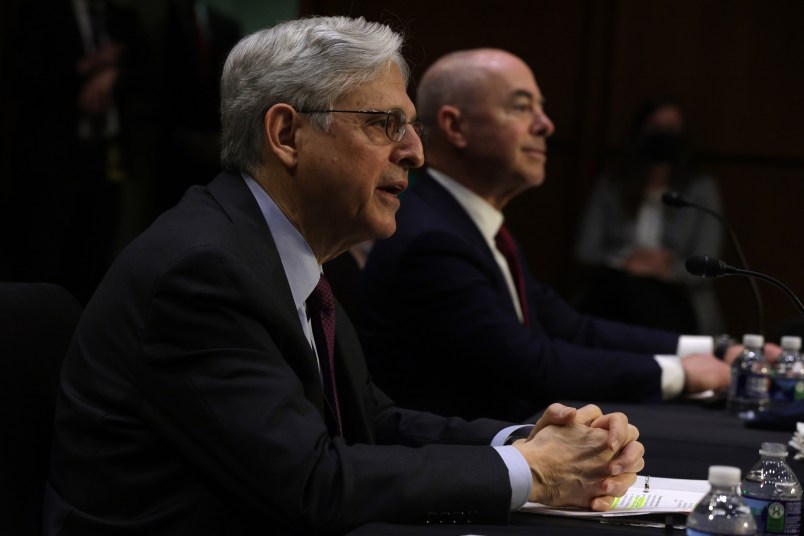Senate Democrats on Wednesday sought answers from the Biden administration on whether former President Donald Trump posed a national security threat to the country by continuing to spew lies about the 2020 election.
In response, two top law enforcement officials in the administration — Attorney General Merrick Garland and Homeland Security Secretary Alejandro Mayorkas — didn’t go after Trump by name, but rather told the Senate Appropriations Committee more generally that the sort of lies he’s told could propel further violence.
Sen. Chris Van Hollen (D-MD) made the most direct attempt of the entire committee hearing Wednesday to get the administration on the record.
He read from a March report from the Office of the Director of National Intelligence, which noted that developments including the Capitol breach “will almost certainly spur some [domestic violent extremists] to try to engage in violence this year.”
Both Garland and Mayorkas said they agreed with that report. But when Van Hollen went farther — quoting Rep. Liz Cheney (R-WY), who said Tuesday that Trump’s lying about the election “risks inciting further violence” — the administration officials weren’t willing to single out Trump specifically.
“False narratives create a lack of confidence in our democratic institutions, and sometimes worse,” Mayorkas said simply.
It’s not unreasonable that Garland and Mayorkas would hesitate to name Trump: Both officials are dealing with the fallout of the Jan. 6 Capitol attack, and any comment about the former President could open them up to criticism that political bias is influencing their decisions.
Garland, for example, declined to discuss the dozens of Capitol riot defendants who’ve explicitly cited Trump’s influence on their actions.
“I don’t think it’s an appropriate thing for me, as supervising those prosecutions, to make any comments outside of the court record,” he said.
But, without naming Trump, the attorney general was willing to speak in general about factors that have contributed to violent extremism.
“It is right, as the intelligence community has reported, that particularly those who end up committing acts of domestic violence get ideas from the internet, and from statements, where there are false narrative and false statements, those are the kinds of things that can, depending upon the person in the end who acts out, lead to violence,” Garland said.
Van Hollen’s questions followed a few minutes after those of Sen. Jeanne Shaheen (D-NH), who pressed Mayorkas on whether public officials’ statements about the 2020 election being stolen contributed to the threat of violence.
“The spread of false narratives are used to fuel extremist ideologies, and we are focused on the connection between extremist ideologies and the threat or intention to commit acts of violence,” Mayorkas said, adding later: “False narratives attributed to public officials gain traction in social media.”







FBI Director Christopher Wray’s absence from this hearing (and most post-1/6 new conferences) is glaring.
I once thought that he was a solid public servant, particularly because of the abuse he endured from Trump and RW media, but his unwillingness to testify explaining his leadership leading up to the insurrection and experiences on 1/6 in an open forum is a big red flag.
Could it not be the same thing that Garland stated? FBI is investigating and tracking down the insurrectionists. If Wray testifies than that can give defense attorneys cause to argue political bias.
Understanding how much the intelligence leading up to the insurrection pointed to the inevitability of violence is a critical area that Christopher Wray needs to contribute to. This in no way jeopardizes the criminal investigations or court cases.
If asked a question that would reveal details of ongoing investigations, there’s always a stock response that an public official can use to avoid a direct answer.
More than half the Republicans in Congress failed to act to protect the certification of the 2020 certified presidential election results of the states.
“ . . . the mechanics of the Electoral College allowed the defeated president to incite his followers into mounting the first attempt in U.S. history to seize the presidency by violence. Far from preventing them, the anti-majoritarian mechanisms of presidential elections were the crucial culprit in creating the “tumult and disorder” and the “heats and ferments” that so worried the authors of the Constitution.”- David Frum, 2/15/21
“Republicans are using Trump’s failed attempt to overturn the election as a guide to how you would change the system to make it possible.” – Jamelle Bouie, 3/30/21
If Trump lost the popular vote, the GQP planned to emphasize the Electoral College.
If he lost the Electoral College, they would promote spurious claims of election fraud and support challenges to the electors in Republican-controlled statehouses.
Recounts and GQP bills taking power over elections from local officials and giving it to the legislature to undermine the fair administration of elections and vote counting, are not a response to nonexistent voter fraud. They are a response to high Democratic voting turnout.
The GQP seems terrified of the potential of Democratic voters when all voters matter and count equally.
Republicans hope for scenarios where they can lose by millions of votes and still win the Electoral College.
Now we need to support and urge state legislators in states with the 75 more electoral votes needed, to enact the National Popular Vote bill to guarantee the presidency to the candidate who wins the most popular votes in the country.
You know who else got away with a failed coup?
— Mein Kampf (Volume I, Chapter X)